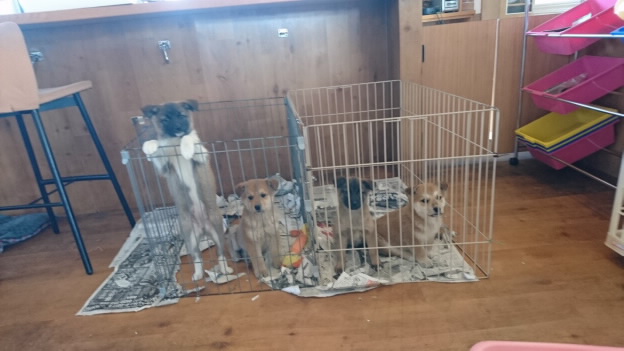By Rumi Naito
NORTHWEST ASIAN WEEKLY
Rumiko Ohnari was pinned beneath a bookcase in her ruined house by the temblor that rocked Kumamoto Prefecture on April 16, 2016. The heavy piece of furniture broke Rumiko’s leg, but the rest of the family was unharmed, including her three dogs. Like many in Kumamoto, the Ohnari family was rejected by numerous shelters because they wouldn’t give up their dogs. Instead, the family slept in their car for three months until they were connected with Peace Winds, a Seattle-based NGO providing pet-friendly shelters to evacuees in Mashiki, the epicenter of the earthquake. During an in-person interview at her new temporary house in Mashiki last October, Rumiko told Peace Winds, “We would not have survived without the Peace Winds shelter.”
Challenging lives of Kumamoto evacuees
This April marks the one-year anniversary of Kumamoto earthquakes. Peace Winds reconnected with Rumiko to find out how she’s doing. “We can’t make a living…” were her first words over the phone. After the disaster, household incomes declined dramatically as there were not enough jobs available. The population in Mashiki was 32,600 before the disaster, it has decreased by 5,000. This population decrease has made it difficult for local businesses to thrive. The disaster caused an economic depression.
Rumiko kept pleading, “I found that all of my three dogs have lost some of their teeth. Can you believe this?” Her dogs stay home all day in a tiny cage in her very small temporary house (only 208 square feet) because Rumiko works outside. These dogs have to stay inside even on weekends because the neighbors who don’t own pets complain about the dogs’ behavior. Now the no-dog-outside rule is strictly regulated by her township committee. Rumiko has found that her dogs have been completely stressed out by being caged.

Pets need shelter in Kumamoto
Pets have been an important source of comfort for earthquake survivors in Kumamoto. However, many have decided to turn their dogs over to pet shelters because of their limited living space. Now, pet shelters are full.
Peace Winds has decided to support a local dog rescue organization called Dog Rescue Kumamoto. Following the earthquakes, this shelter has been inundated with animals and shelter staff struggle to keep up. Yoshihiro Ikumatsu, a representative of Dog Rescue Kumamoto, says, “The day-to-day work taking care of our animals limits the time staff has to look for foster parents.”
Now with 57 pets and just two staff members, Dog Rescue Kumamoto is getting a boost of support from Peace Winds.
Temporary shelters working together to help elderly residents
One year after the earthquakes, support from outside organizations has decreased so the residents must help one another. A Local Union Network of township presidents from the 18 temporary housing sites in Mashiki was established in February. The Union is concerned about the decline of the physical health of elderly long-term residents, as well as an increase in their “dying alone anxieties.” The Union aims to improve the safety and security of elderly residents by working together to address these issues and share best practices.
Yasohachi Tawara, the township president of Hirosaki temporary housing, helped establish the Union.
Yasohachi, 83, and one of the many elderly in temporary housing, worries about the elderly living alone.
Yasohachi says, “Strengthening the collaboration and coordination among all temporary housing sites will help each township deal with their problems.” The Union also provides community gatherings that bring all residents together. Yasohachi believes this helps reduce isolation for the elderly, rebuild their lives, and create a real sense of community. In their work in Tohoku after the 2011 disasters, Peace Winds learned that the elderly are particularly vulnerable to isolation, which has caused premature death among temporary housing residents.
For more information about Peace Wind’s efforts to mitigate and respond to natural disasters in the Asia Pacific, please visit peacewindsamerica.org.



